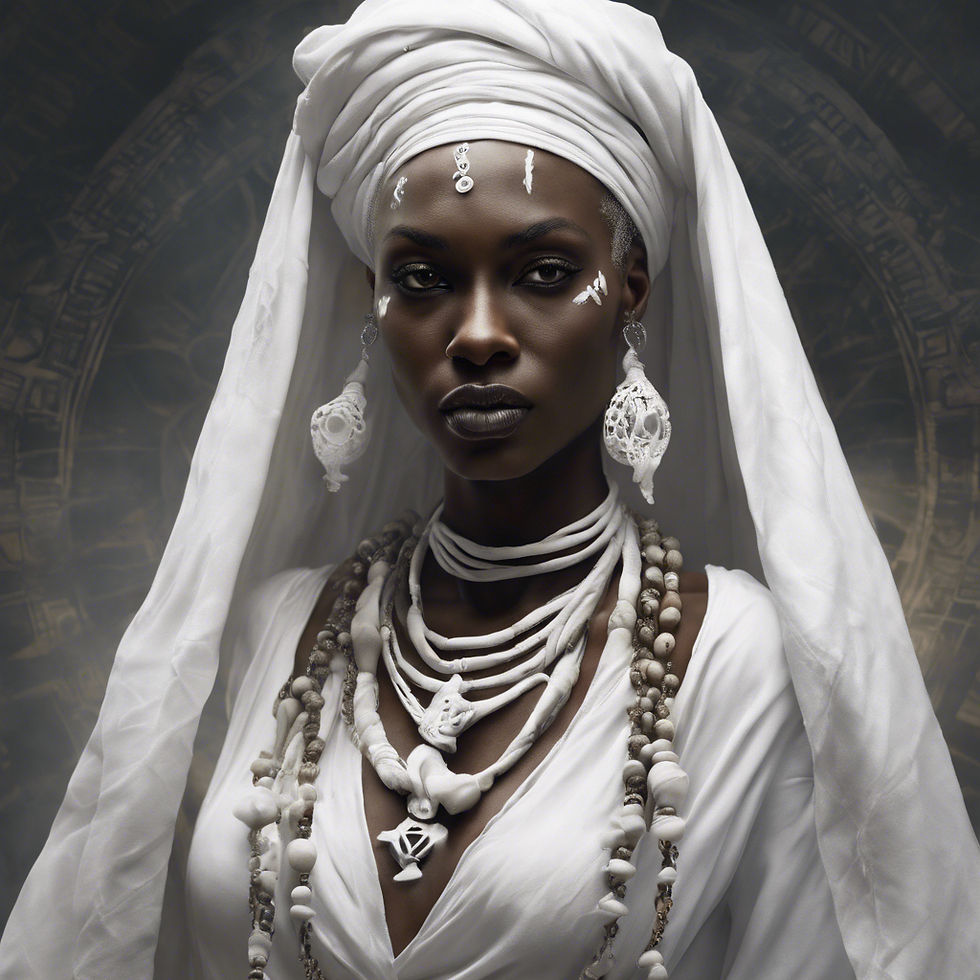
Hoodoo vs Voodoo, what’s the difference
- zakaholisticvibes
- Jul 23, 2024
- 4 min read
Updated: Dec 13, 2025
Title: Unveiling the Mysteries: Hoodoo vs. Voodoo Exploring the Difference
Introduction
The realms of Hoodoo and Voodoo have long captivated the imagination of many, shrouded in mystery, folklore, and a rich tapestry of cultural practices. However, despite their often intertwined narratives, Hoodoo and Voodoo are distinct belief systems with unique origins, practices, and cultural significance. In this blog post, we embark on a journey to unravel the complexities of Hoodoo and Voodoo, exploring their differences and shedding light on the myths and folklore that surround them.
Hoodoo vs. Voodoo: Understanding the Basics
Hoodoo and Voodoo are often erroneously conflated, leading to confusion and misconceptions about both traditions. To begin with, it is essential to acknowledge that Voodoo, also spelled as Vodou or Vodun, is a religion with various branches and practices that originated in West Africa and evolved through the transatlantic slave trade to the Americas, particularly in Haiti and New Orleans.
On the other hand, Hoodoo, also known as conjure or rootwork, is a form of folk magic that emerged in the Southern United States, blending African, Native American, and European spiritual traditions. Unlike Voodoo, Hoodoo is not a religion but a magical system focused on the use of herbs, roots, and charms for healing, protection, and spiritual purposes.
Distinguishing Features of Hoodoo and Voodoo
1. Geographical Variations: Voodoo exhibits regional variations based on its roots in different African cultures and its adaptation to diverse environments in the Americas. Haitian Vodou, Louisiana Voodoo, and West African Vodun are just a few examples of these distinct forms of the religion. In contrast, Hoodoo's practices vary within the Southern United States but lack the same structured religious framework as Voodoo.
2. Belief Systems: Voodoo incorporates a pantheon of deities known as Lwa, rituals, ceremonies, and spiritual possession, emphasizing the interconnection between the physical and spiritual realms. In contrast, Hoodoo practitioners often work with spells, charms, and rituals that draw upon the natural world and personal intent rather than worshiping specific gods or spirits.
3. Historical Context: The history of Voodoo is intricately tied to the experiences of enslaved Africans in the New World, serving as a source of cultural resilience, identity, and resistance. Hoodoo, with its roots in African American folk traditions and Native American practices, emerged as a means of preserving cultural heritage and navigating the challenges of slavery and oppression.
Myths and Folklore Surrounding Hoodoo and Voodoo
Over the years, both Hoodoo and Voodoo have been subject to numerous myths and misconceptions that have perpetuated stereotypes and sensationalized portrayals in popular culture. Some common myths include:
1. Evil and Dark Practices: Both traditions have often been unfairly depicted as malevolent or sinister forms of magic associated with curses, hexes, and harmful spells. In reality, Hoodoo and Voodoo encompass a wide range of practices focused on healing, protection, and spiritual growth.
2. Stereotypical Representations: Mainstream media has frequently portrayed practitioners of Hoodoo and Voodoo as exotic or mystical figures, reinforcing harmful stereotypes and overlooking the cultural significance and diversity of these traditions.
Conclusion
In conclusion, the distinctions between Hoodoo and Voodoo are nuanced and multifaceted, rooted in their unique histories, belief systems, and cultural contexts. By exploring the differences between these two traditions, we can gain a deeper appreciation for the rich tapestry of spiritual practices that have shaped the lives of countless individuals and communities.
Let’s talk about getting started
As we navigate the complexities of Hoodoo and Voodoo, it is essential to approach these traditions with respect, understanding, and a willingness to engage with their cultural nuances beyond surface-level stereotypes. By delving into the myths, folklore, and histories that surround Hoodoo and Voodoo, we can begin to unravel the mysteries that have long intrigued and captivated seekers of knowledge and wisdom.
For those interested in further exploring the realms of Hoodoo and Voodoo, there are a variety of reputable resources available that offer valuable insights into these traditions.
In a world where diversity and cultural heritage are increasingly celebrated and embraced, understanding the differences between Hoodoo and Voodoo serves as a testament to the resilience, creativity, and spiritual depth of communities that have preserved and nurtured these traditions through generations.
As we continue to unravel the mysteries of Hoodoo and Voodoo, let us approach these traditions with an open mind, a willingness to learn, and a recognition of the profound wisdom and beauty they offer to those who seek to explore the depths of the human spirit.
References for Haitian Vodou, culture and history*
By delving into the complexities and nuances of Hoodoo and Voodoo, we can gain a deeper understanding of the cultural richness and spiritual diversity that have shaped these traditions and continue to inspire seekers of knowledge and wisdom around the world.
May our exploration of Hoodoo and Voodoo lead us to a greater appreciation of the interconnectedness of all spiritual traditions and a recognition of the profound beauty and power that resides within the human spirit.
If you’d like to be part of the Vodou community to learn in depth of the practice, the history and the culture of Haiti, join our Patreon page at:
Ayibobo!!!!!




Comments